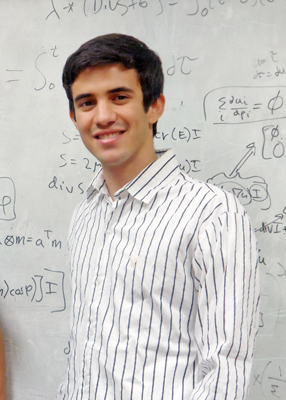Perez, a sophomore biological science major at The University of Texas at El Paso, will spend eight weeks modeling protein translation and genome evolution.
The Knoxville-based National Institute for Mathematical and Biological Synthesis (NIMBioS) selected Perez to be part of its Research Experience for Undergraduates (REU). He is among 18 picked from a pool of 100 math and biology students from around the country for the program that ends Aug. 3.
“This has been a great experience for me,” Perez said. “It helps me to apply the knowledge I get through lectures. By using what I learn, I understand it even more.”
The 19-year-old said his goal is to earn a doctorate and a medical degree. He began to push himself academically in high school to take advanced chemistry and biology courses and to compete in various science competitions.
At UTEP, Perez works in the lab of Manuel Llano, Ph.D., assistant professor of biological sciences. He studies how cellular proteins directly interact with HIV. What impressed Llano immediately was Perez’s offer to work in his lab for free during the summer of 2011 while he was a student at El Paso Community College.
“That showed me a lot about him. I knew he was committed to the research,” said Llano, who encouraged Perez to transfer to UTEP. Perez earned a fellowship from the Campus Office of Undergraduate Research Initiatives in fall 2011.
“He gets along with the other researchers, works long hours, and sets high standards for himself,” Llano said. “You can see he wants to be successful. It’s a pleasure to work with him.”
Michael Gilchrist, Ph.D., UTK associate professor in the Department of Ecology and Evolutionary Biology, is overseeing Perez’s NIMBioS research. He called Perez “bright and inquisitive,” and a quick learner. He said Perez has a solid understanding of the complex work expected of him.
“All of this indicates that he has not only a quick mind, but a solid foundation in biology and science on which he can integrate new knowledge,” Gilchrist said.
He said programs such as the institute’s summer experience prepare undergraduates to work on cutting-edge, hands-on research.
“They allow students to move from being a consumer of knowledge to a producer of knowledge. Understanding how scientific knowledge is created helps students to appreciate the work involved and the limitations and caveats that go along with this type of research,” he said. “With the growing number of problems facing us in the modern world, it is clear we need good scientists to help identify potential solutions.”
NIMBioS, sponsored by the National Science Foundation, seeks to foster interdisciplinary research between math and biological sciences. Other supporters are the U.S. departments of Homeland Security and Agriculture.
